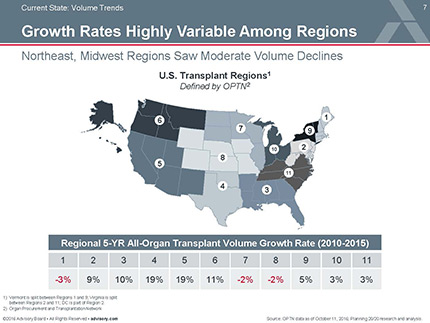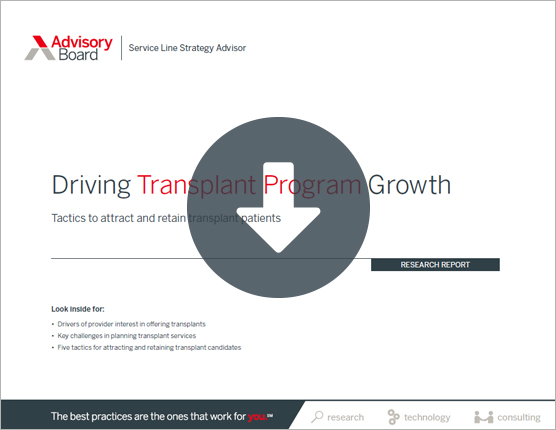Auto logout in seconds.
Continue LogoutA lung transplant patient acquired a peanut allergy after receiving an organ from a donor with the food allergy—an occurrence that doctors say is very rare, according to a case report in the journal Transplantation Proceedings.
Here are 5 key tactics to attract and retain transplant patients
A smooth recovery, interrupted
The patient, a 68-year-old female who was being treated at UC San Diego Medical Center, underwent a single-lung transplant to treat emphysema. The donor was a 22-year-old male, according Mazen Odish, a fellow in pulmonary and critical care medicine who treated the patient.
After a successful procedure and smooth recovery, the transplant recipient was preparing to go home when she reported tightness in her chest and difficulty breathing, according to the case report.

Download ready-to-present slides on the transplant market
Doctors ran tests but initially found no explanation for the patient's symptoms, which mimicked signs of respiratory failure.
Then, the patient mentioned she had eaten a peanut butter and jelly sandwich before the symptoms started. With that information in hand, the doctors suspected the woman may have received an allergy in addition to a lung from her donor.
A call to the transplant agency confirmed the doctor's theory: The patient's donor had had a peanut allergy. According to the case study, the patient had no history of food allergies before the procedure, but an allergy test later revealed she was now allergic to peanuts, almonds, cashews, coconuts, and hazelnuts after the transplant.
The mystery of transplant-acquired food allergies
According to Live Science, it's "very rare" for a lung transplant recipient to acquire a food allergy from the donor organ.
Mazen Odish, a fellow in pulmonary and critical care medicine who treated the patient and lead author of the case report, said there are only four or five documented cases of organ recipients reporting a transplant-acquired food allergy after a lung transplant.
According to the case study, there also have been recorded cases of transplant-acquired food allergies from other organ transplants, including bone marrow, heart, kidney, liver, and lung transplants.
Certain conditions can increase the likeliness that a patient will acquire an allergy from their organ donor. For instance, research suggests that people who receive liver transplants are more likely to acquire food allergies from their donors. Other studies show that organ recipients who are prescribed the immunosuppressive drug tacrolimus are more likely to pick up food allergies from their donors. The patient in the case study had been prescribed that drug.
According to Odish, some patients with transplant-acquired food allergies don't show allergy symptoms for days or even months, and doctors are still unsure whether the transplant-acquired allergies are lifelong for patients or diminish over time. As a result, patients will have to undergo repeated allergy tests over their lifetimes to detect any changes in sensitivity due to their acquired allergy.
Patients who acquire food allergies may also need to adjust their eating habits going forward. Doctors gave Odish's patient an EpiPen and advised that she avoid consuming peanuts and tree nuts (Nierenberg, Live Science, 12/31/18; Cook, Becker's Clinical Leadership & Infection Control, 12/31/18).
Here are 5 key tactics to attract and retain transplant patients
Download this briefing to learn how to expand the pipeline of potential transplant patients and engage them across the care pathway.
Don't miss out on the latest Advisory Board insights
Create your free account to access 1 resource, including the latest research and webinars.
Want access without creating an account?
You have 1 free members-only resource remaining this month.
1 free members-only resources remaining
1 free members-only resources remaining
You've reached your limit of free insights
Become a member to access all of Advisory Board's resources, events, and experts
Never miss out on the latest innovative health care content tailored to you.
Benefits include:
You've reached your limit of free insights
Become a member to access all of Advisory Board's resources, events, and experts
Never miss out on the latest innovative health care content tailored to you.
Benefits include:
This content is available through your Curated Research partnership with Advisory Board. Click on ‘view this resource’ to read the full piece
Email ask@advisory.com to learn more
Click on ‘Become a Member’ to learn about the benefits of a Full-Access partnership with Advisory Board
Never miss out on the latest innovative health care content tailored to you.
Benefits Include:
This is for members only. Learn more.
Click on ‘Become a Member’ to learn about the benefits of a Full-Access partnership with Advisory Board
Never miss out on the latest innovative health care content tailored to you.

